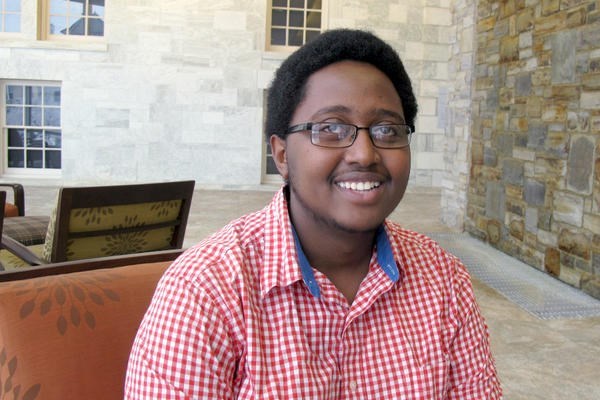 |
| Middlebury College junior Armel Nibasumba founded a camp in his native country of Burundi designed to break down ethnic barriers between Hutus and Tutsis.
Wilson Ring/AP |
MIDDLEBURY, VT. - Middlebury College student Armel Nibasumba grew up in the shadow of the central African genocide of the early 1990s, even fleeing from his home in Burundi as a toddler with his family before it was burned by a mob.
Now, he is committing his life to helping end the tensions that led to the deaths of more than 1 million people in the region.
Two years ago, Mr. Nibasumba, a Middlebury junior, founded what he called a peace camp in the Burundi capital of Bujumbura, where ethnic Hutus and Tutsis in their late teens and early 20s could break down ethnic barriers by getting to know one another and learning the value of using for-profit businesses to produce social change.
Last summer, Twese for Peace, using the word for "everyone" in Burundi's predominant language of Kirundi, hosted 35 young people during a 12-day camp, held at a boarding school in Bujumbura. Nibasumba eventually hopes the camp can host 100 young people.
"The problem in Burundi is the opposing ethnicities cohabitate, but they don't talk," Nibasumba said recently at Middlebury before returning home for the winter break. "They don't talk about what made the conflict, why we fight."
Middlebury helped him start the camp in the summer of 2013 with a $3,000 grant from the school's Center for Social Entrepreneurship. Last summer he got a $10,000 grant from the Projects for Peace program, a separate nonprofit group at Middlebury.
"Armel is outgoing and great to talk to," says Middlebury spokeswoman Sarah Ray. "Undaunted by the challenges his country faces, he is trying to create a better future."
In January, Nibasumba plans to attend a management training course in Rwanda conducted by Middlebury's Monterey Institute for International Studies. Nibasumba is now in the process of setting up a nonprofit organization that will be based in Vermont.
"I believe that I am the future of Burundi. We are the future of Burundi. If we don't start now to actually build our future ... we don't want to make the same mistakes our forefathers did," he says. "Our camp was a way to foster communication and understanding between people."
He was 1 year old when he and his family fled their home while a mob overran and burned it down.
While most of the world's attention focused on the 1994 killing of an estimated more than 800,000 ethnic Tutsis in northern neighbor Rwanda by the majority Hutu population, the same tensions were at play in Burundi. The killing there began in late 1993 with a civil war. Some estimate 300,000 people have died in Burundi.
Nibasumba, 22, won't say which ethnic group he belongs to. He grew up in Bujumbura listening to gunfire and bombings and seeing bodies in the streets. Nevertheless, he describes his childhood as happy. He credits his upbringing with enabling him to rise above the ethnic hatred that still festers today.
"The country has gone through so much; we should be dead right now," he says.
Nibasumba dates his social activism to the two years he spent at the United World College of Southern Africa in Swaziland where students from many ethnicities and races lived together. It was there that a school counselor suggested Nibasumba apply to Middlebury.
The main objective of the camp is to build leaders for the future, which is why it combines conflict management with social entrepreneurship.
"You can't have sustainable peace without a sustainable economy because if people don't have enough to eat they will fight to get it," he says.
Page created on 12/30/2014 12:00:00 AM
Last edited 8/3/2018 12:20:53 AM
